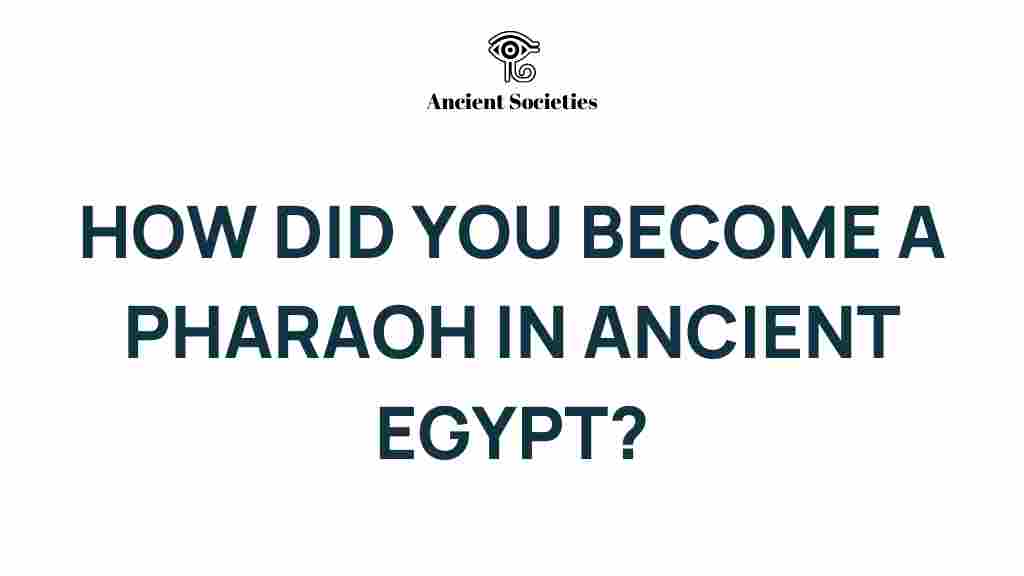Unveiling the Secrets: How One Became Pharaoh in Ancient Egypt
In the fascinating tapestry of Ancient Egypt, the title of Pharaoh held immense power and prestige. Understanding how one could ascend to this lofty position reveals much about the culture, rituals, and the complex dynamics of leadership in one of history’s most remarkable civilizations. In this article, we will explore the pathways to becoming a Pharaoh, the significance of dynasties, and the rituals that marked this transformative journey.
Understanding the Role of a Pharaoh
The term Pharaoh is synonymous with the rulers of Ancient Egypt who wielded absolute power. They were considered both political and religious leaders, serving as intermediaries between the gods and the people. This duality in leadership was crucial to maintaining the stability and prosperity of the empire.
The Significance of Leadership
Pharaohs were not merely rulers; they were embodiments of divine authority. Their leadership style was often characterized by:
- Divine Right: Pharaohs were believed to be chosen by the gods, granting them unquestionable authority.
- Military Command: A Pharaoh was expected to lead armies into battle, protecting the nation from external threats.
- Economic Stewardship: The prosperity of ancient Egypt depended on agriculture, trade, and resource management, and the Pharaoh had to ensure the well-being of the economy.
The Path to Power
Becoming a Pharaoh was not an arbitrary process; it was steeped in tradition and ritual. The steps to ascend the throne can be categorized into several key phases.
1. Birthright and Dynasty
Most Pharaohs hailed from established dynasties. The concept of dynastic rule was vital in Ancient Egypt:
- Royal Lineage: Typically, a Pharaoh was the son of the previous ruler, ensuring continuity of power.
- Marriage Alliances: Marrying into powerful families helped solidify claims to the throne.
- Royal Succession: In cases where a Pharaoh died without a clear heir, succession disputes could lead to conflict.
2. Rituals of Ascension
Rituals played a crucial role in legitimizing a new Pharaoh’s rule. These ceremonies often included:
- Coronation: The official ceremony where a Pharaoh was crowned, often involving elaborate rituals.
- Horus Name: A Pharaoh’s name was often preceded by the name of Horus, linking them to divine authority.
- Sacred Rites: Performances of rituals that honored the gods and ensured their favor.
3. Establishing Authority
Once crowned, a new Pharaoh needed to establish their authority:
- Building Projects: Initiating monumental architecture, such as temples and pyramids, showcased power and divine favor.
- Military Campaigns: Early victories in battle served to solidify a Pharaoh’s reputation as a strong leader.
- Religious Reforms: Aligning closely with the priesthood to gain spiritual legitimacy was essential.
Challenges and Troubleshooting
Despite the seemingly straightforward path to becoming a Pharaoh, numerous challenges could arise:
Succession Disputes
When a Pharaoh died, rival factions often emerged:
- Legitimacy Questions: Claims to the throne by different family members could lead to civil unrest.
- Influence of the Nobility: Powerful nobles could sway public opinion against a new ruler.
Maintaining Power
Once in power, a Pharaoh faced ongoing challenges:
- Public Discontent: Poor harvests or military failures could lead to uprisings.
- Foreign Relations: Diplomatic ties and trade agreements were crucial for stability.
The Cultural Legacy of Pharaohs
The impact of Pharaohs extended beyond their reigns. They shaped the culture of Ancient Egypt in profound ways:
Art and Architecture
Pharaohs commissioned vast building projects that still awe us today:
- Pyramids: These monumental tombs were constructed to ensure a Pharaoh’s safe passage to the afterlife.
- Temples: Massive temples dedicated to deities showcased the Pharaoh’s devotion and power.
Religion and Mythology
The Pharaoh’s role as a divine leader influenced religious practices:
- God-King Concept: The Pharaoh was seen as the living embodiment of the gods on Earth.
- Mythological Narratives: Stories about Pharaohs often intertwined with myths, enhancing their divine status.
Documentation and Records
Pharaohs sponsored scribes and historians to document their reigns:
- Hieroglyphics: The writing system allowed for the recording of significant events and achievements.
- Royal Annals: Lists of Pharaohs and their accomplishments were carefully maintained.
Conclusion
Becoming a Pharaoh in Ancient Egypt was a complex journey filled with traditions, rituals, and challenges. From the divine right of kings to the cultural legacies they left behind, the Pharaohs shaped the very fabric of Egyptian society. Their leadership defined eras, and their monumental achievements continue to inspire awe. Understanding the pathways to power in Ancient Egypt is not just a lesson in history, but a glimpse into the enduring nature of leadership, culture, and the pursuit of power.
For those interested in exploring more about Ancient Egyptian history and its remarkable leaders, you might find this resource on Egyptian dynasties enlightening.
To delve deeper into the rituals and culture surrounding the Pharaohs, consider checking out this external guide to ancient Egyptian rituals.
This article is in the category History and created by AncientSocieties Team
